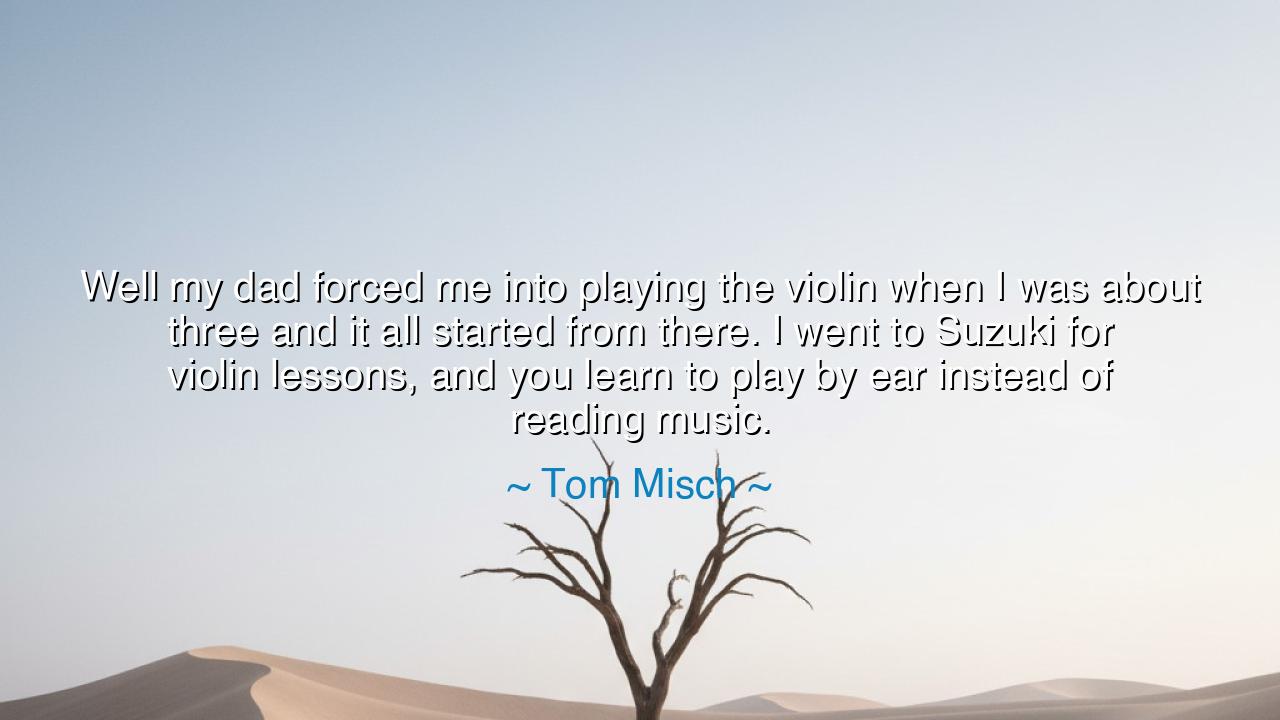
Well my dad forced me into playing the violin when I was about
Well my dad forced me into playing the violin when I was about three and it all started from there. I went to Suzuki for violin lessons, and you learn to play by ear instead of reading music.






Hearken, O children of melody and memory, and attend to the words of Tom Misch: “Well my dad forced me into playing the violin when I was about three and it all started from there. I went to Suzuki for violin lessons, and you learn to play by ear instead of reading music.” Herein lies a meditation upon the ancient truth of guidance, discipline, and the awakening of talent. From the cradle of youth, the hand of a parent, gentle yet firm, can guide a child toward a path that shapes the soul, even when the child knows not the full measure of its destiny. What begins as compulsion may transform into the flowering of innate potential.
Consider the nature of learning by ear, as in the Suzuki method. The child does not simply read symbols upon a page; the child listens, absorbs, and internalizes the music of the world. This is the rhythm of life itself: to hear before one comprehends, to feel before one reasons, to connect directly with the essence of creation. In this way, music becomes not a series of abstract marks but a living language, resonating within the spirit and carrying lessons of patience, attention, and the intimate relationship between effort and artistry.
History bears witness to the power of early cultivation. Wolfgang Amadeus Mozart, himself a child of prodigious talent, was guided by his father Leopold, who, though stern and demanding, recognized the divinity within his son. Mozart began performing at ages scarcely believable, his ear attuned to harmonies that would later enthrall the world. Likewise, Tom Misch’s father, though insisting upon the violin, opened the gateway to a lifetime of expression, creativity, and sensitivity that would echo far beyond the earliest lessons.
This tale also illuminates the delicate balance between discipline and freedom. At first, the violin was a mandate, a structure imposed upon the young. Yet, through the Suzuki method, listening became an act of liberation. The child learns to navigate the language of sound intuitively, discovering the beauty of improvisation, the power of memory, and the joy of creation. Thus, what begins as compulsion can evolve into passion, shaping character, resilience, and a unique artistic voice.
Consider too the universality of such lessons. Across cultures and ages, parents have guided children into realms of skill—painting, poetry, or craft—often beginning with insistence rather than choice. Yet the gift lies not in coercion alone but in exposure to the forms of excellence, the immersion in practice, and the patient cultivation of ability. The earliest experiences, repeated with care and attention, leave impressions that endure, shaping the mind, hand, and soul in ways invisible yet profound.
From this reflection emerges practical wisdom. Encourage curiosity and discipline together; allow the ear, the heart, and the mind to engage fully. Embrace methods that connect feeling with understanding, that teach through experience rather than mere instruction. Recognize that early guidance, even when imposed, can awaken dormant talent, provided it is coupled with patience, support, and an environment that nurtures exploration and discovery.
Let generations remember this eternal truth: the roots of artistry often grow in childhood, guided by those who perceive potential before it is fully known. The combination of discipline, listening, and intimate practice cultivates a mind attuned to nuance, a spirit attuned to beauty, and a character attuned to perseverance. Tom Misch’s recollection of his earliest violin lessons reminds us that the seeds of greatness are sown in seemingly small acts of attention and care.
Therefore, O seeker of wisdom and skill, embrace both guidance and practice. Listen deeply, cultivate your senses, and allow early lessons to take root in the fertile soil of curiosity and discipline. Know that what begins as a forced act may become the language of your soul, that what is learned by ear may awaken a voice that resonates beyond measure, and that in the patient cultivation of talent lies the path to lifelong artistry and fulfillment.






AAdministratorAdministrator
Welcome, honored guests. Please leave a comment, we will respond soon